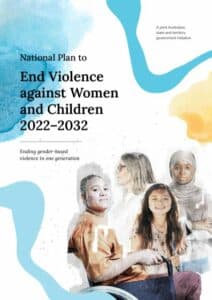Friday 17 November is White Ribbon Day, providing an opportunity to reflect on the challenge we face in overcoming men’s violence against women.
Domestic violence is a pervasive issue that affects individuals and families across the globe.
Australia is not immune, with one woman killed by an intimate partner every 10 days. While the data says that situation is not as bad as it was a few years ago, the human toll is still to high and domestic violence remains ever-present, with more work still to be done.
As one of Australia’s largest private sector employers of women, this is a critical issue for the retail sector. Victim-survivors of domestic violence work on the front-line of retail, in management roles and in positions of leadership, often hidden in plain sight.
What is domestic violence?
Domestic violence, also known as intimate partner violence, encompasses a range of abusive behaviours used by one person in a relationship to gain power and control over another. These behaviours can include physical, emotional, financial, or sexual abuse.
Statistics reveal that one in six Australian women and one in 16 Australian men have experienced physical or sexual violence from a current or former partner since the age of 15.
These statistics are alarming and highlight the urgent need for action.
What is government doing to address the issue?
The Australian government has implemented various initiatives to combat domestic violence. In 2022 the Australian, state and territory governments released the National Plan to End Violence against Women and Children 2022–2032 (National Plan).
The National Plan is the overarching national policy framework that will guide actions towards ending violence against women and children over the next 10 years. It outlines what needs to happen to achieve the vision of ending violence in one generation, across four domains:
How are community organisations supporting?
Services like 1800RESPECT, Domestic Violence Crisis Service and White Ribbon Australia provide crisis support, counselling and resources to those affected. These organisations play a crucial role in empowering survivors and helping them rebuild their lives free from violence.
Other organisations such as Our Watch undertake research, deliver education and awareness programs that harness the power of prevention as another strategy to drive change. The more that schools, community organisations and employers talk about healthy relationships, consent and the signs of abuse, the better of chances of breaking the cycle of violence.
What should employers do to support victim-survivors?
One of the significant challenges in addressing domestic violence is the stigma that surrounds it. Victims often face judgment, shame and fear, which can prevent them from seeking help. It is essential to create a culture of empathy and support, where survivors are encouraged to come forward without fear of judgment.
This stigma and its impact can be most keenly felt in the workplace, which is why it’s important that employers foster an environment where victim-survivors feel safe, respected and believed.
Employers also have obligations in terms of providing victim-survivors with access to paid domestic violence leave. All employees (full-time, part-time and casual) can access ten days of paid leave if they are experiencing family or domestic violence. You can find out more from the Fair Work Ombudsman’s website at https://www.fairwork.gov.au/leave/family-and-domestic-violence-leave
And finally, it is critical that the workplace is free of discrimination in all its forms. While there are currently no legislative measures in place (yet) about discriminating against victim-survivors of domestic violence but gender-based discrimination is illegal.
Because some discrimination is borne out of a lack of understanding or information, nurturing an environment where victim-survivors feel safe and supported in taking about their experience is the best way to help educate people in the workplace and prevent discrimination.
Where can victim-survivors and their networks go for help?
If you or someone close to you is in distress or immediate danger, please call 000.
For information, support and counselling about family, domestic and sexual violence, you can contact 1800RESPECT (1800 737 732) or go to www.1800respect.org.au
Full Stop Australia National provides trauma counselling and recovery service for people of all ages and genders experiencing sexual, domestic and family violence. This service is free and confidential. Available 24/7. 1800 943 539 www.fullstop.org.au
Rainbow Sexual, Domestic and Family Violence Helpline provides help for anyone from the LGBTQ+ community whose life has been impacted by sexual domestic and/or family violence. This service is free and confidential. Available 24/7. 1800 497 212
Well Mob Social, emotional and cultural well-being offers online resources for Aboriginal and Torres Strait Islander peoples. www.wellmob.org.au
Men’s Referral Service is available to anyone in Australia whose life has been impacted by men’s use of violence or abusive behaviours. Available 7 days. 1300 766 491 www.ntv.org.au
My Blue Sky Provides free legal and migration support to people experiencing forced marriage and other forms of modern slavery in Australia. Call 02 9514 8115 or go to www.mybluesky.org.au
Links to other resources referenced in this article are lists below.
National Plan to End Violence against Women and Children 2022–2032 (National Plan).
Domestic violence is a pressing issue in Australia that demands collective action. By supporting victim-survivors, raising awareness, and challenging societal norms, we can work towards a future free from domestic violence. Together, we can break the silence and create a safer, more compassionate society for all Australians.
Violence against women and children can be hard to discuss. If this information has resonated with you or caused issues, please reach out for help.























